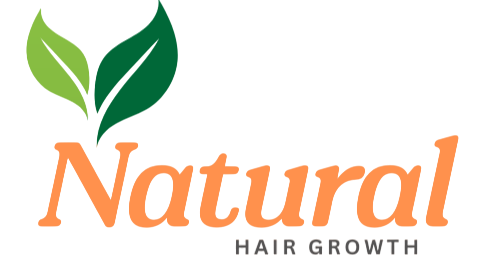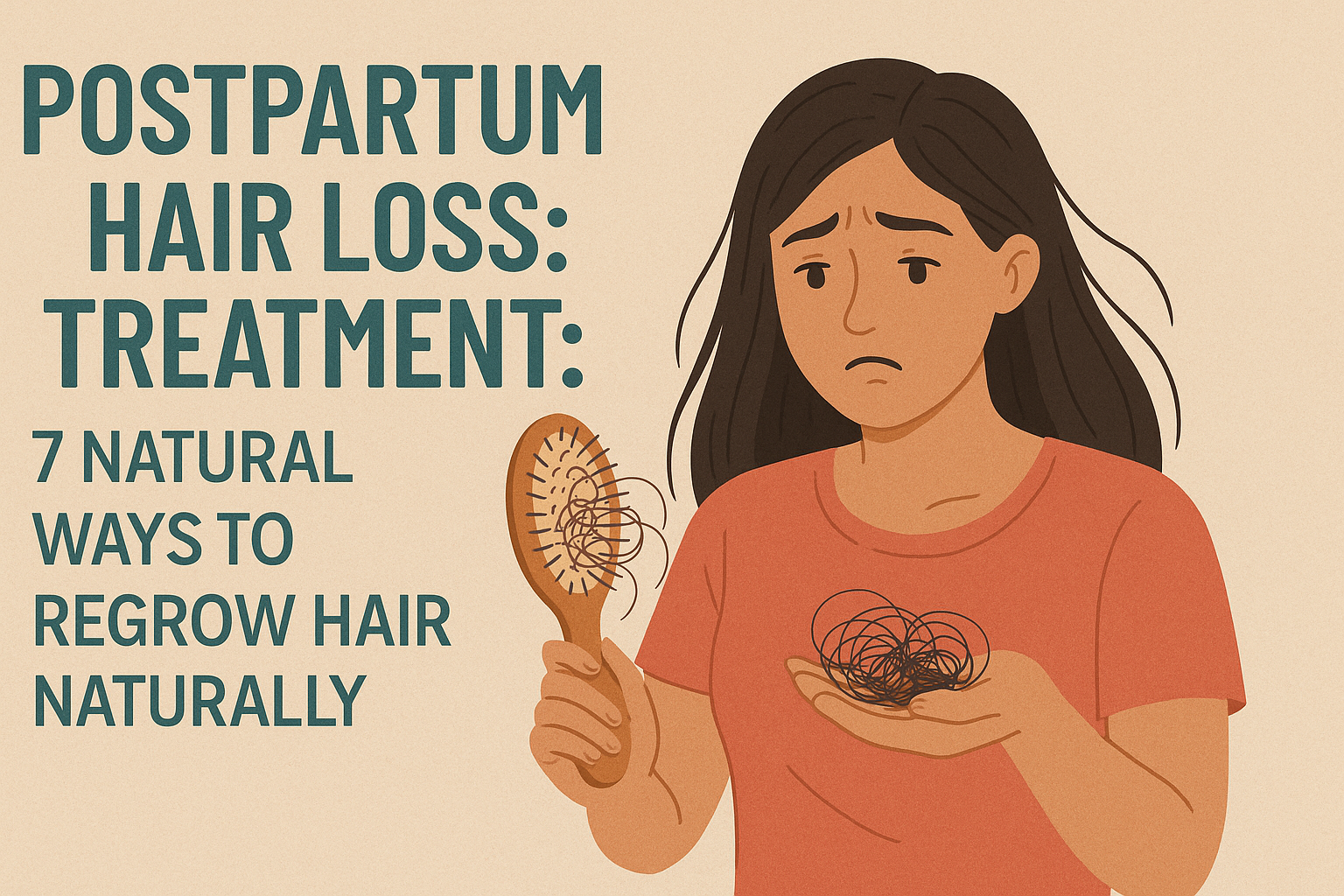Table of Contents
ToggleOverview: Postpartum Hair Loss Treatment
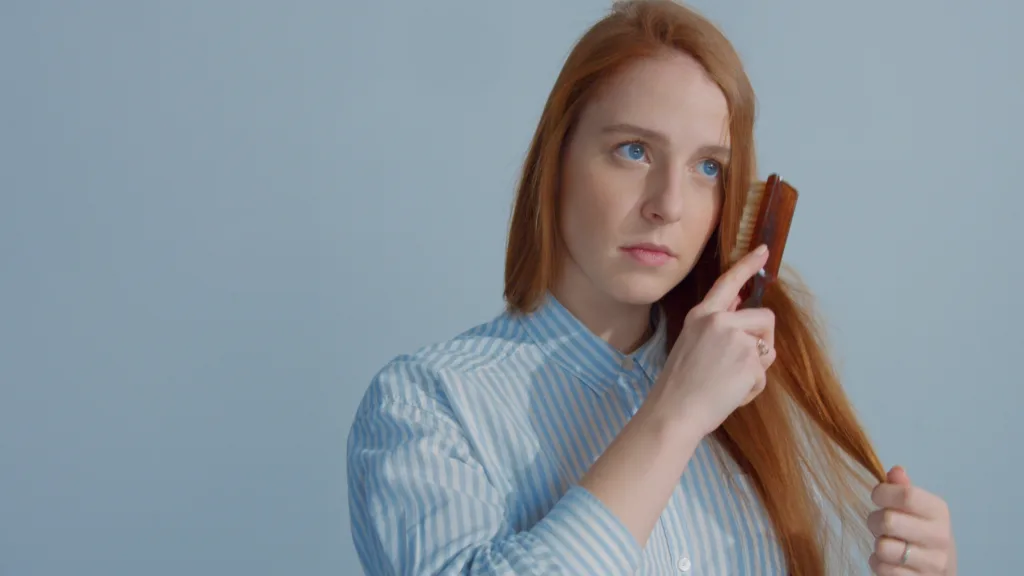
Bringing a new life into this world is a magical and emotional journey—one that touches nearly every mother deeply.
While the joy of holding your little one for the first time is unmatched, many new moms also face an unexpected challenge: postpartum hair loss.
If you’re seeing more hair on your pillow, in your brush, or even while washing your hair, don’t worry—you’re not the only one going through this.
It’s completely normal to experience hair fall after having a baby, and the reassuring part is—it doesn’t last forever. This condition, which typically shows up a few months after delivery, affects many women and usually resolves on its own over time.
The best part is, you can turn things around with simple and natural methods that help boost hair regrowth and bring back strength to your strands.
In this article, we’ll explore what causes postpartum hair loss, the science behind it, and how you can you regrow hair naturally with care and patience
What Is Postpartum Hair Loss?
Before diving into treatments, let’s understand what postpartum hair loss actually is. Medically, it’s referred to as telogen effluvium, a temporary condition that often begins around 2 to 4 months after childbirth.
The primary reason behind this sudden shedding is hormonal changes. While you’re pregnant, your estrogen levels increase, which helps keep your hair growing longer without falling out.
However, once the baby is born, these hormone levels drop quickly, leading to an increased number of hair follicles entering the shedding phase. While it can feel alarming,
it’s a natural part of your postpartum journey—and in most cases, it resolves within a few months to a year.
Common Causes of Postpartum Hair Loss
Here are the key triggers behind postpartum hair fall:
- Hormonal Fluctuations: During pregnancy, high estrogen levels prevent normal hair fall. After delivery, these levels drop rapidly, causing the hair to shed all at once.
- Stress and Sleep Deprivation: Taking care of a newborn can be overwhelming. When your body is physically drained and your mind is under stress, it can take a toll on your hair’s health and cause increased hair fall.
- Nutritional Deficiencies: New moms often experience a lack of essential nutrients such as iron, protein, biotin, and vitamin D—all of which are crucial for hair strength and growth.
- Thyroid Imbalance: Postpartum thyroid disorders, such as hypothyroidism or hyperthyroidism, are another common cause of hair thinning or excessive shedding during this period.
7 Gentle & Natural Ways to Regrow Hair After Pregnancy
It’s completely normal for new moms to notice more hair falling out in the months after giving birth. Don’t worry—it’s just your body adjusting to hormonal changes, and it’s usually temporary. The good news?
There are safe, natural ways to help your hair grow back healthy and strong—without depending on harsh chemicals.
Let’s walk through some effective remedies you can try from the comfort of your home.
1. Rejuvenate Your Scalp with Nourishing Oil Massages
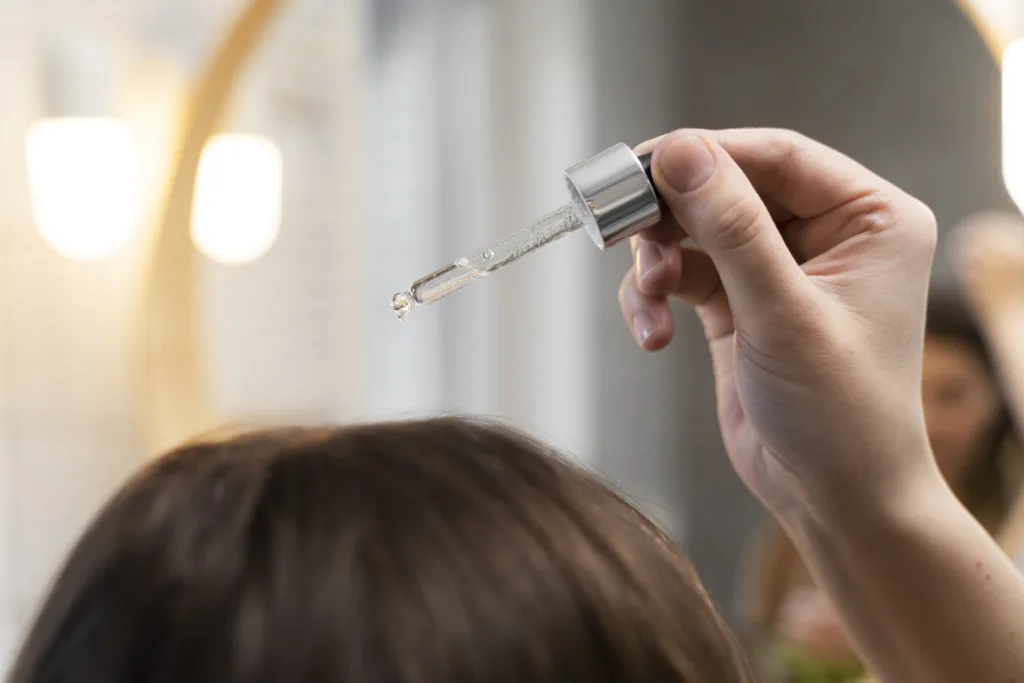
Massaging your scalp with the right oils can do wonders for blood circulation and hair follicle health, making it easier for hair to grow back thicker and stronger.
Here are some oils worth trying:
Coconut Oil: Deeply hydrating and full of essential fatty acids, it strengthens hair strands and helps prevent breakage.
Castor Oil: Known for its richness in ricinoleic acid, this oil is amazing for promoting denser hair growth and waking up sleepy hair follicles.
Rosemary Essential Oil: A powerful oil that helps improve scalp circulation, reduce shedding, and support new growth.
Quick Tip: Mix 2–3 drops of rosemary oil with 1 tablespoon of coconut oil and massage into your scalp gently twice a week. It feels soothing and supports healthy regrowth.
2. Fuel Your Hair from Within with the Right Nutrition
What you eat plays a huge role in how your hair grows back after childbirth. Including nutrient-rich foods can speed up recovery and give your hair the strength it needs to thrive.
Focus on:
- Iron-rich foods: Spinach, tofu, lentils
- Protein sources: Eggs, nuts, legumes, and dairy
- Vitamin C & E: Oranges, sunflower seeds, almonds—for healthy scalp and hair strands
- Omega-3s are essential for hair strength—load up on them through flaxseeds, walnuts, or oily fish like salmon and mackerel
A balanced plate doesn’t just support hair—it helps boost your energy levels too.
3. Soothe Your Scalp with Fresh Aloe Vera
Aloe vera is nature’s remedy for calming an irritated scalp and restoring moisture, especially if you’re dealing with dryness or itchiness.
How to use it:
- Grab a fresh aloe vera leaf, cut it open gently, and extract the soothing gel from inside to apply directly on your scalp.
- Leave it on for 30–45 minutes.
- Wash it off with plain water, then use a gentle, chemical-free shampoo to cleanse your scalp.
- Using aloe vera 2–3 times a week can leave your scalp feeling refreshed and help hair grow in healthier.
4. Switch to Gentle, Natural Shampoos
Many regular shampoos contain harsh ingredients like sulfates or parabens that can strip your scalp of natural oils. Instead, look for herbal or natural alternatives with ingredients such as:
- Bhringraj
- Reetha
- Hibiscus
- Amla
- Aloe Vera
Also, avoid washing your hair too often. Washing your hair two to three times a week is usually just right—it helps keep your scalp clean and healthy without stripping away natural oils.
5. Practice Scalp Yoga and Relaxation to Reduce Stress
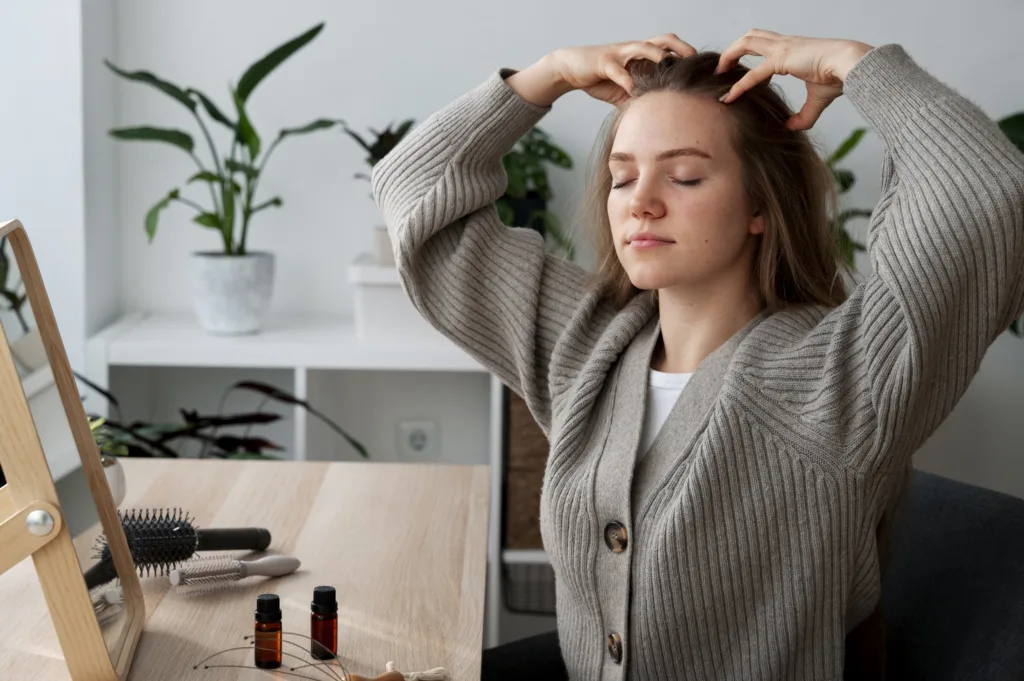
Stress is one of the hidden reasons behind hair loss. Managing it naturally can help slow shedding and support hormonal balance.
Here are a few gentle ways to de-stress:
- Try deep breathing or short meditation sessions
- Do simple yoga stretches
- Take power naps when your baby sleeps
Even a quick 10-minute rest can help recharge your body and balance your hormones—giving your hair a better chance to grow back strong.
6. Use Onion Juice to Stimulate Hair Follicles
It might sound surprising, but onion juice is packed with sulfur, which helps improve blood flow to the scalp and supports regrowth.
How to use:
- Extract fresh onion juice.
- Apply it to the scalp using a cotton ball and massage gently.
- Leave it on for 25–30 minutes, then wash with a mild shampoo
- Use this method twice a week for visible results over time.
7. Stay Hydrated and Get Plenty of Rest
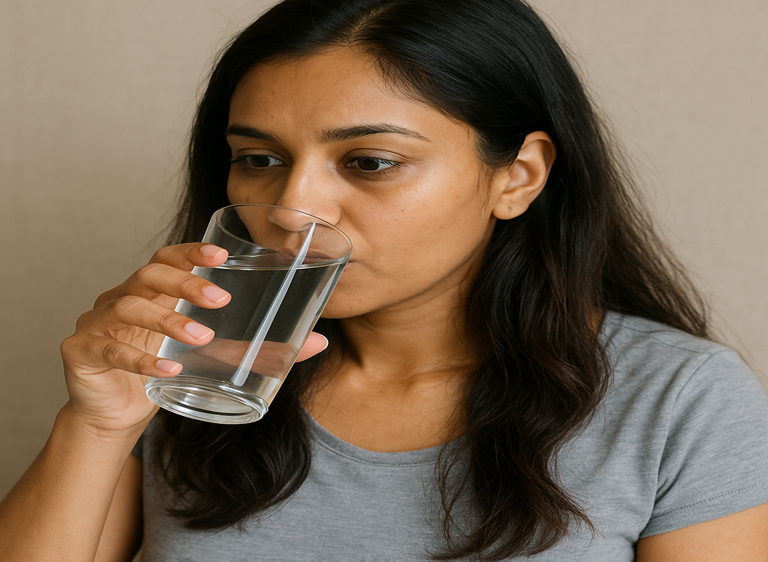
Caring for a newborn often means putting your own needs last—but your hair health depends on proper rest and hydration.
Make it a habit to drink 8–10 glasses of water during the day—your body and hair will thank you.
Also Read: 5 Effective Home Remedy for Hair Fall
Onion Juice for Hair Growth: 7 Benefits of Onion Juice for Hair
When Will Postpartum Hair Loss Slow Down?
Most women begin noticing extra hair shedding about two months after delivery. This is simply your body adjusting as estrogen levels shift.
The shedding phase usually improves on its own by the time your baby turns 6 to 12 months old. With patience and consistent care, your hair can regain its former fullness.
According to WedMD: The increased hair loss after having a baby is not a sign that you are losing your hair permanently. Your hair should return to its usual growth patterns over time.
Simple Habits to Prevent Excessive Hair Fall
- Use a wide-tooth comb to slowly work through tangles—this helps prevent breakage and keeps your hair healthy.
- Avoid tight buns or ponytails that pull on your roots—go for soft, loose hairstyles instead.
- Pat your hair dry with a soft towel instead of rubbing, and try to avoid using heat styling tools to keep your strands healthy and damage-free.
- Make sure you’re eating a well-balanced diet and staying hydrated—drinking plenty of water helps your body and hair stay nourished from within.
When Should You Consult a Doctor?
If you’re still facing heavy hair loss a year after childbirth, it’s a good idea to speak with your doctor. In some cases, continued hair loss might be a sign of an underlying health issue such as:
- Thyroid imbalances
- Iron deficiency (anemia)
- Polycystic ovary syndrome (PCOS)
Getting medical advice can help you identify the root cause and get the right treatment if needed.
Final Thoughts
Experiencing hair fall after childbirth is a natural part of your body’s healing process—it’s completely normal and usually temporary.
Your body has just gone through an incredible experience—and now it’s healing. By following these gentle, natural practices and showing your hair some extra love, you’ll support regrowth and overall wellness too.
Stay patient, stay consistent—and trust that your hair will bounce back beautifully.
Want more hair care tips? Visit hairhealthcaretips.com for detailed guides on natural hair growth solutions.
Share this article with fellow moms — because healthy
hair is possible after baby!
Frequently Asked Questions
Q1: Is postpartum hair loss permanent?
No. It’s a temporary phase and with the right care, hair usually grows back within 6 to 12 months.
Q2: Can breastfeeding cause hair loss?
Breastfeeding doesn’t directly cause hair loss, but the hormonal shifts that occur during and after pregnancy can contribute.
Q3: How soon will natural remedies show results?
You may start noticing results in 2–3 months of consistent use. Natural treatments work gradually but effectively.
Q4: Should I take supplements?
Only take supplements like iron, biotin, or postnatal vitamins if recommended by your doctor.
